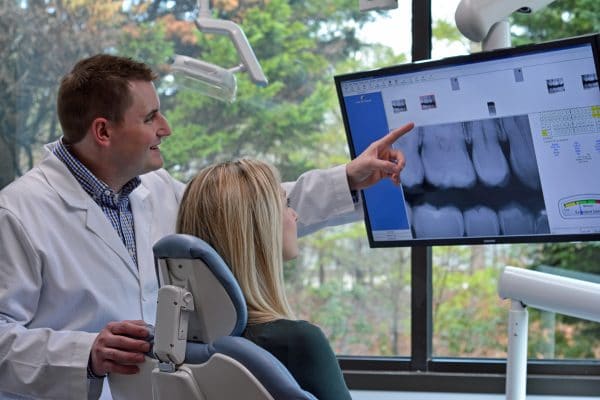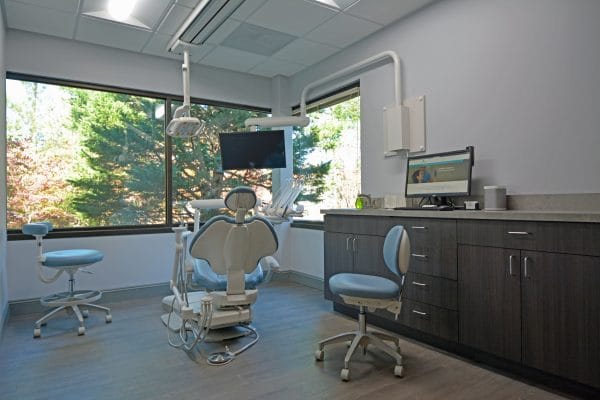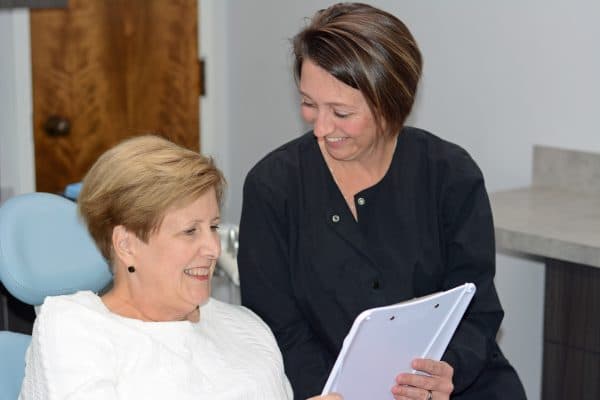Root Canals Chapel Hill
fall in love with your smile
Root Canal Therapy for Infected Pulp
Root canal therapy is often suggested for individuals who have developed an infected pulp. The pulp can become infected if a serious cavity has developed or due to trauma and/or a crack in the tooth. If the pulp is damaged, bacteria multiplies in the pulp chamber, which can result in an infection that can cause an abscess to develop. This infection can also cause swelling in the head, neck, and face.
Other common symptoms of an infected root pulp include the following:
- Severe toothache
- Pain while chewing or applying any pressure to the tooth
- Swollen gums
- Changes in the shade or color of a tooth
- Sensitivity to foods or beverages that are cold (ice cream) or hot (soups)
Although root canal therapy has a reputation for being incredibly painful, it is actually a very common procedure that is extremely effective in saving a tooth or teeth from being extracted. Also, having this procedure performed will ultimately result in relieving you of pain.
If you are experiencing any of these issues, please contact our office today. Allowing the infection to spread will only result in further damage. By taking this important step, you may be able to save your tooth or teeth from being extracted.
If you would like to schedule an appointment or if you have any questions about our treatment options, please contact our office at (919) 595-1010. We look forward to creating the smile you have always desired a reality for you.
Pulpotomy
A pulpotomy is the name commonly used to refer to a root canal that is performed on children. Because children’s teeth are softer and more prone to decay, they are at an increased risk of developing issues related to decay. Unlike a pulpectomy, which involves removal of the pulp followed by the pulp being replaced with dental cement, a pulpotomy only involves the removal of pulp from the tooth’s crown. To qualify for a pulpotomy, the tooth must be able to be restored and your child must be in good general health and not have any chronic conditions that make them more susceptible to developing bacterial infections.
Steps and Timeframe
Prior to having root canal therapy, you will need to have an initial consultation so your dentist can review your dental and medical history, discuss your concerns, perform an examination, and if necessary, take X-rays or photos to determine the current state of your oral health.
If it is determined that root canal therapy is necessary, the procedure will likely begin with the administration of a local anesthetic near the tooth. Next, a rubber dam will be placed to keep the area dry and a small hole with be drilled into the tooth and the injured pulp will be removed. Once this pulp has been removed, the root canal system will be disinfected using sodium hypochlorite or water. Once cleaned and disinfected, the dentist will either allow for a period of time (generally one week) to treat the infection with medication, or they will place a filling or dental crown for patients who have a greater amount of decay in order to prevent infection from developing and to seal the tooth. If your dentist decides to wait one week, a temporary filling will be placed.
Please be aware that our office does offer nitrous oxide and oral sedation, which can help reduce pain and/or any anxiety you may be feeling during the procedure.
Proper Care Improves Longevity of the Root Canal Therapy
To continue enjoying the benefits of your root canal therapy, be sure to practice good oral hygiene habits every day. If you follow these best practices, you will enjoy good oral health for years to come.
- Brush twice daily (minimum) and practice proper brushing technique. In addition to brushing regularly, it is also important to brush effectively. Our staff will be happy to answer any questions you may have about proper brushing techniques.
- Floss daily. If you are someone who tends to avoid flossing, you may want to consider flossing alternatives, such as interdental brushes or floss picks.
- Be mindful of your diet. One of the best ways you can prevent dental issues from developing is to avoid foods that are sugary or high in starch. If you do drink soda or sugary beverages, try to use a straw to limit exposure of sugar to your teeth. It is also important to swish your mouth with water following meals, as doing so can dislodge food remnants, which, if left alone can create future tooth decay.
- Schedule regular dental exams. Unchecked dental issues can result in additional issues and progression of decay, which is why it is so important to visit your dentist every six months. In addition to providing a deep clean for your teeth and diagnosing potential issues before they progress, these regular checkups also allow your dentist to monitor the status of your root canal.





High-Quality Dental Care
At Cornerstone Family Dentistry in Chapel Hill, all our services are performed with the patient in mind. We want you to feel comfortable in the dental chair, confident in our work, and most importantly, we want you to fall in love with your smile again. If you would like to schedule an appointment or if you have any questions about cosmetic procedures that we offer, please contact us at (919) 595-1010.
